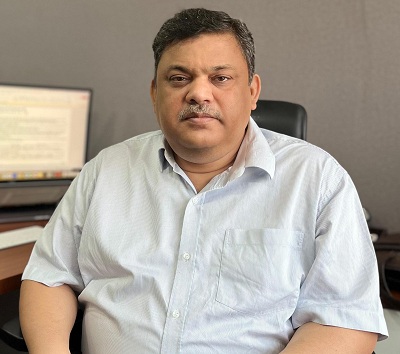
NEC has played a pivotal role in shaping India’s digital and social infrastructure, particularly in public safety, smart cities, logistics, transportation, and more. India’s recent ranking of 42nd in the 2024 International IP Index highlights the need for a stronger intellectual property (IP) system to fuel innovation and economic growth. In this exclusive interview, Mr. Shiv Kumar Singh, Chief Operating Officer, NEC Corporation India shares his insights on IP development in India and how India can enhance its IP policy, fostering a robust framework grounded in trust, transparency, and innovation to attract global investors.
Could you provide an overview of recent product launches by NEC Corporation India? Additionally, how do these products illustrate the company’s dedication to innovation and the development of intellectual property?
NEC Corporation India, with a strong presence in India for over 70 years, is heavily focused on leveraging its expertise in research and development to create tailored solutions across a variety of sectors. NEC India has emerged as a dominant player in the realm of Smart Cities, leveraging its expertise in advanced technologies like Biometrics, AI, IoT, and data analytics and has successfully executed smart city projects across the nation, creating sustainable, efficient, and technologically integrated urban societies. This commitment is demonstrated through our diverse projects, particularly within our Global Smart City Suite, which includes 4 key innovations recently developed as intellectual property.
The first of these is the NEC Mi-Command, which is an Integrated Command and Control Centre (ICCC. This provides a unified platform for city operations, enhancing management efficiency and responsiveness to urban needs. It integrates various operational functions with real-time analytics and geospatial tracking, optimizing resource management and incident handling.
In a bid to facilitate participative governance, the NEC Mi-City a comprehensive Citizen Engagement Portal streamlines access to government services, providing a user-friendly interface for managing permits, licenses, and other civic needs, which enhances transparency and public engagement in urban management.
The NEC Mi-Eye, another critical component of our suite, is an AI and ML-enabled video analytics solution. It offers real-time insights into public safety, operational efficiency, and customer behavior, significantly enhancing security and surveillance capabilities across urban areas.
Further expanding our technological footprint, NEC has developed and implemented various other domain-specific solutions such as the NEC Mi-WareSync, a cloud-based warehouse management system that improves inventory accuracy and operational efficiencies.
These solutions underscore our ability to design and deploy high-tech systems tailored to the nuanced requirements of different sectors within the Smart City ecosystem—ranging from public safety and transportation to logistics and warehousing. Intellectual property plays a significant role in these developments, allowing NEC to protect and manage unique innovations that enable the delivery of high-value solutions to our customers. By owning the intellectual property, NEC can ensure that these solutions are adaptable and scalable, not only meeting the current needs of Indian cities but also capable of evolving with their future demands.
Furthermore, with the development of these solutions under the IP of NEC India, we are strengthening our alignment with the government’s vision for ‘Make in India’ or complete self-reliance coupled with the spirit of Japanese brilliance and engineering excellence. This also feeds into NEC’s broader strategy of “In India, for India, from India for Global,” harnessing local talent and innovations to create products and solutions with global applications. This strategy not only supports India’s digital infrastructure but also positions NEC as a leader in the global technology landscape, driving the development of future-ready, smart urban environments worldwide.
What key technologies do you see driving intellectual property development in India, particularly within NEC?
At NEC Corporation India, the development of intellectual property is heavily influenced by advancements in artificial intelligence (AI) and machine learning. These technologies like NEC Mi-Eye are integral to our projects, which utilizes AI to deliver actionable insights into security and operations. Additionally, cloud computing is central to enhancing our capabilities, as seen in NEC Mi-WareSync, a warehouse management system that leverages the cloud to improve logistics and supply chain operations with scalability and real-time data analytics.
Moreover, the integration of Internet of Things (IoT) technology within our smart city and infrastructure solutions allows for more connected and responsive urban environments. These technologies are not just driving the development of new intellectual property but are also ensuring that our solutions are innovative and relevant on a global scale. By focusing on these areas, NEC is strategically positioning itself to lead in the creation of cutting-edge, secure, and efficient technological solutions that cater to both local and international markets.
What factors do you believe are essential for the success of intellectual property management in India?
Successful intellectual property management in India relies heavily on a strong legal framework that rigorously protects intellectual property rights, encouraging further investment in research and development. Equally important is the strategic collaboration among academia, industry, and government, which can speed up technological innovations and their application to meet specific market needs. Additionally, cultivating an innovation-centric culture within organizations is crucial. Moreover, the Government of India’s Atma Nirbhar Bharat initiative is a prime example of how national policies can encourage companies like ours to drive the development of new technologies, further bolstering our efforts towards self-reliance and technological sovereignty. At NEC, fostering such a culture means prioritizing continuous learning, encouraging creative problem-solving, and supporting initiatives that push technological boundaries. This approach not only propels intellectual property development but also ensures the solutions are practical, beneficial for the community, and resonate with market demands, thereby driving sustained growth and innovation.






